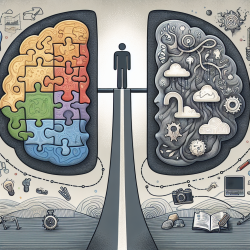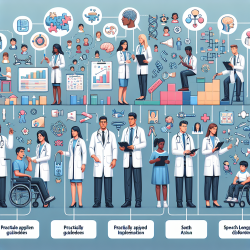Understanding Cognitive Biases as Adaptive Strategies
The research article "Cognitive biases as an adaptive strategy in autism and schizophrenia spectrum: the compensation perspective on neurodiversity" offers a compelling perspective on cognitive biases within the autism and schizophrenia spectrums. By integrating evolutionary and computational approaches, the study highlights how these biases serve as primary adaptive strategies, with potential cognitive advantages through compensation.
Key Insights for Practitioners
For practitioners in speech language pathology, especially those involved in online therapy services like TinyEYE, understanding these cognitive biases can significantly enhance therapeutic outcomes. Here are some key takeaways:
- Adaptive Cognitive Strategies: Recognize that cognitive biases in autism, such as hyper-systemizing, can offer advantages in specific contexts, like detail-oriented tasks. Similarly, in schizophrenia, hyper-mentalizing might aid in social cognition under certain conditions.
- Therapeutic Interventions: Tailor interventions to leverage these cognitive strengths. For instance, in autism, focus on enhancing systematizing skills, while in schizophrenia, work on refining social cognitive skills.
- Environment Adaptation: Create supportive environments that align with the unique cognitive profiles of individuals on these spectrums. This can involve structured settings for autism and dynamic, socially engaging contexts for schizophrenia.
Encouraging Further Research
Practitioners are encouraged to delve deeper into the compensatory mechanisms of cognitive biases. Understanding the ecological niches where these biases thrive can lead to more personalized and effective therapeutic strategies. This research opens avenues for exploring how these cognitive profiles can be harnessed for societal contributions and personal growth.
Conclusion
By viewing cognitive biases as adaptive strategies, practitioners can shift from a deficit-focused approach to one that celebrates neurodiversity. This perspective not only enhances therapeutic interventions but also fosters a more inclusive understanding of autism and schizophrenia.
To read the original research paper, please follow this link: Cognitive biases as an adaptive strategy in autism and schizophrenia spectrum: the compensation perspective on neurodiversity.










